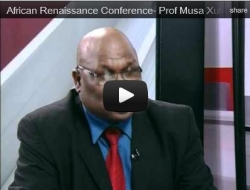Correctional Services at Work2013-05-06 Professor Musa Xulu, Deputy Commissioner: Research & Marketing, Department of Correctional Services, South Africa
Often, the general public, through no fault of its own, is unaware of the offender empowerment and rehabilitation programs that take place within the correctional facilities. Some of these fall within the departmental directorate called Production Workshops and Agriculture. The ultimate objective of running productivity programmes is to facilitate rehabilitation through work in preparation for the eventual reintegration of offenders into society, after they finish their sentences. The rehabilitation and correctional approach of the modern Department of Correctional Services is motivated by a desire to bring the best human virtues out of offenders so that upon reintegration into society they are better and productive members of society. This does not reduce the significance of penalties that follow offending. It is simply a movement, in line with the penal theories of Michel Foucault in his 1977 work Discipline and Punish: The Birth of the Prison, from a “corporal†to a “carceral†view of punishment by imprisonment. Foucault sees prisons as being in the same league as factories, schools, workhouses and others, where behaviour is controlled and formalised. However, offender labour in Correctional Services facilities is, unlike the Foucault models, not forced labour. Currently, the primary focus of the workshops and agriculture is to create products which are in turn supplied to the Department to render it self-sufficient. It also uplifts the productivity of offenders while reducing the costs of running correctional facilities. In the agricultural farms on correctional facilities offenders gain opportunities to train in agricultural skills, thus improving their prospects of employability upon release. Production workshops include 10 wood workshops, 10 steel workshops, 19 textile workshops, a shoe factory, 6 bakeries and 3 sanitary towel workshops â€" spread all over the country. These are run as business units. Agricultural productivity is expressed through 21 Correctional Centre farms and 96 smaller vegetable production sites, spread over some 40 000 hectares worth of land space, throughout South Africa. The following products are produced: vegetable production is done on 21 farms and 108 smaller centres; fruit production is done on 13 farms; milk production is done on 17 farms; red meat is produced on 24 farming units; chicken is produced on 4 farms; layers are produced on 8 farms; there are red meat abattoirs on 17 farms; white meat abattoirs on 3 farms and 15 farms focus on pig production. The markets for the products are currently limited to addressing the internal needs of the Department, as well as servicing other government departments and state owned enterprises. The department has also signed a Memorandum of Understanding with the Department of Basic Education in order to allow offender labour to manufacture and rehabilitate school furniture as well as assist in the establishment of school gardens. Further talks are under way about the role of offender labour in the construction of new classrooms. A Trading Account, which will see the formal generation of revenue for government has been set in motion. Treasury directives are awaited in this regard. One of the greatest proponents of the Marxist theories on penology was Antonio Gramsci. Unlike many other proponents and sociologists of Marxists theories, Gramsci wrote most of his works as a prisoner. This followed his imprisonment by the Italian fascists from 1929 till his death in 1937. The lesson to be learnt from Gramsci is that it is possible for an offender to become intellectually productive even under circumstances of incarceration. To this end, the Minister of Correctional Services has introduced the Reading for Redemption programme that aims to put a book a month in the hands of every offender. Reading expands horizons, changes perspectives and creates possibilities never heard of before. Additionally, and in line with African thoughts on relations between the offender and the offended, the Minister has introduced the Victim Offender Dialogues which are currently, and will do so well into the future, taking place in Correctional facilities throughout the country. This programme allows offenders, victims and communities to play major roles in openly discussing crime and its emotional, material and intellectual impact on personal, community and national life, as well as seeking to form partnerships in the combat of crime. XX |
Correctional Services at Work
Copyright © 2024 KwaZulu-Natal Top Business
